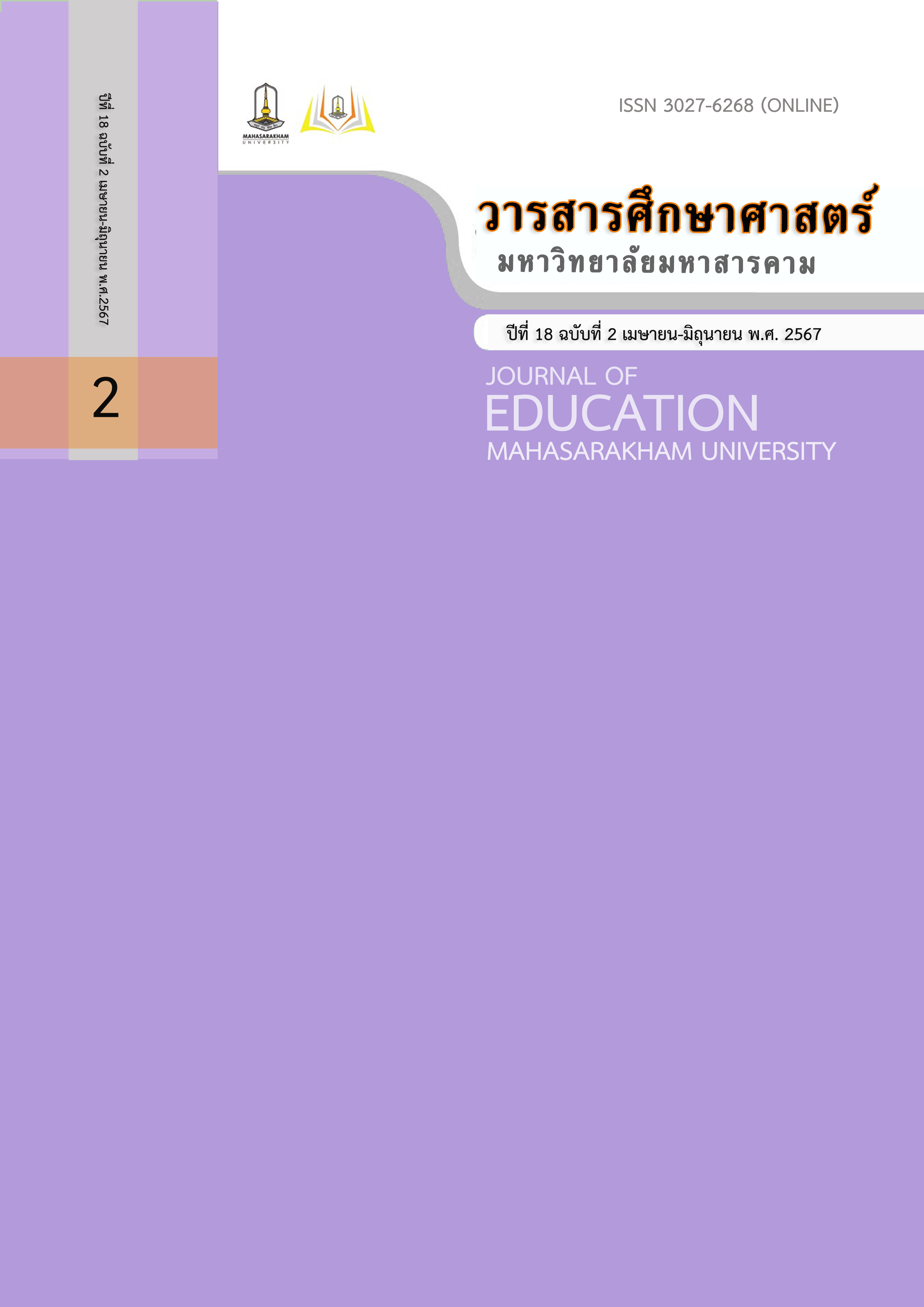The Development of Cooperative Learning Activities with Think-Pair-Share Technique on Citizenship for a Fifth Grade Students
Main Article Content
Abstract
The objectives of this research were 1) to develop cooperative learning activities with the Think-Pair-Share technique on citizenship for the efficiency criteria of 80/80, 2) to compare the analytical thinking ability of the students both before and after study, 3) to study the discipline of students, and 4) to study the students’ satisfaction with this learning activities. The sample group was a total of 20 students in the fifth grade in room number 4, Thesaban 4 Chaloem Phrakiat School, Mueang District, Kalasin Kalasin, obtained by cluster random sampling technique. The research instrument consisted of 1) the 10 lesson plans for cooperative learning activities with Think-Pair-Share techniques with its quality value from 4.82 to 4.90, 2) the 20 questions of achievement test for analytical thinking ability with the discrimination level from 0.25-1.00 and its reliability value of 0.83, 3) the 10 items of discipline observation with the IOC of 0.80-1.00, and 4) the 10 items of questionnaire measuring the student's satisfaction with the IOC of 0.80-1.00. The statistics used in the research were percentage, mean, standard deviation, and t-test. The results of the research found that; 1) the efficiency of cooperative learning activities with the Think-Pair-Share technique on citizenship was 81.12/82.25, 2) the students who studied cooperative learning activities with the Think-Pair-Share technique had higher scores in analytical thinking ability after studying at a statistical significance of .05, 3) the students who studied cooperative learning activities with the Think-Pair-Share techniques had a fair level of discipline for the first time, a good level for the second time, and a good level for the third time, and 4) the satisfaction’s scores of the students was at a high level overall.
Downloads
Article Details

This work is licensed under a Creative Commons Attribution-NonCommercial-NoDerivatives 4.0 International License.
References
กระทรวงศึกษาธิการ. (2553). หลักสูตรแกนกลางการศึกษาขั้นพื้นฐาน พุทธศักราช 2551. พิมพ์ครั้งที่ 3. กรุงเทพฯ: โรงพิมพ์ชุมนุมสหกรณ์การเกษตรแห่งประเทศไทย.
กัลยาดา เหง่าบุญมา และจิรดาวรรณ หันตุลา. (2565). การพัฒนาการคิดวิเคราะห์ด้วยการจัดกิจกรรมการเรียนเชิงรุกโดยใช้เทคนิคเพื่อนคู่คิด เรื่อง วงจรไฟฟ้า ระดับประถมศึกษา. วารสารศึกษาศาสตรมหาวิทยาลัยบูรพา, 33(2), 90-102.
ประยูรศรี กวานปรัชชา, พจมาน ชำนาญกิจ และภูมิพงศ์ จอมหงษ์พิพัฒน์. (2559). การพัฒนารูปแบบกิจกรรมเสริมสร้างคุณธรรมด้านความมีวินัยสำหรับนักเรียน ชั้นประถมศึกษา. วารสารมหาวิทยาลัยนครพนม, 6(2), 52-60.
ภัสรามาศ โพธิญาณ และอัฐพล อินต๊ะเสนา. (2566). การพัฒนาผลสัมฤทธิ์ทางการเรียน เรื่องการอ่านจับใจความโดยใช้การจัดการเรียนรู้แบบสมองเป็นฐานร่วมกับ
เทคนิคเพื่อนคู่คิดสำหรับนักเรียนชั้นมัธยมศึกษาปีที่ 1. วารสารสังคมศาสตร์เพื่อการพัฒนาท้องถิ่น, 7(3), 232-241.
มนตรี เฉกเพลงพิน. (2562). การพัฒนาผลสัมฤทธิ์ทางการเรียนสาระเศรษฐศาสตร์และความสามารถในการคิดอย่างมีเหตุผลของนักเรียนด้วยการจัดการเรียนรู้โดยใช้ปัญหาเป็นฐานร่วมกับเทคนิคการสอน Think-Pair-Share. วารสาร มจร พุทธปัญญาปริทรรศน์, 4(3), 390-402.
โรงเรียนเทศบาล 4 เฉลิมพระเกียรติ. (2565). รายงานการประเมินตนเองของสถานศึกษา. กาฬสินธุ์: โรงเรียนเทศบาล 4 เฉลิมพระเกียรติ
สมศักดิ์ สินธุระเวชญ์. (2544). กิจกรรมพัฒนาผู้เรียนระดับประถมศึกษา. กรุงเทพฯ : วัฒนาพานิช.
สวนดุสิตโพล. (2564). โพลชี้เด็กไทยเก่งเทคโนโลยี แนะเพิ่มวิเคราะห์-เคารพผู้ใหญ่. สืบค้นเมื่อ 27 กรกฎาคม 2566, จาก เดลินิวส์: http://d.dailynews.co.th/politics/817885/
สำนักงานรับรองมาตรฐานและประเมินคุณภาพการศึกษา. (2547). พระราชบัญญัติการศึกษาแห่งชาติ พ.ศ. 2542 แก้ไขเพิ่มเติม (ฉบับที่2) พ.ศ. 2545. กรุงเทพฯ : พริกหวานกราฟฟิค.
สุมน อมรวิวัฒน์. (2542). การพัฒนาการเรียนรู้ตามแนวพุทธศาสตร์ ทักษะกระบวนการเผชิญสถานการณ์. นนทบุรี : มหาวิทยาลัยสุโขทัยธรรมาธิราช.
สุรางค์ โค้วตระกูล. (2544). จิตวิทยาการศึกษา. กรุงเทพฯ : สำนักพิมพ์แห่งจุฬาลงกรณ์มหาวิทยาลัย.
อรัญ ซุยกระเดื่อง. (2557). การวิจัยทางการศึกษา. มหาสารคาม : ตักสิลาการพิมพ์.
Lyman, F. (1987). Think-Pair-Share: An Ending Teaching Technique. United States of America: MAA-CIE Cooperative News.
Sampsel, A. (2013). Finding the Effects of Think-Pair-Share on Student Confidence and Participation. Honors Projects. Retrieved


